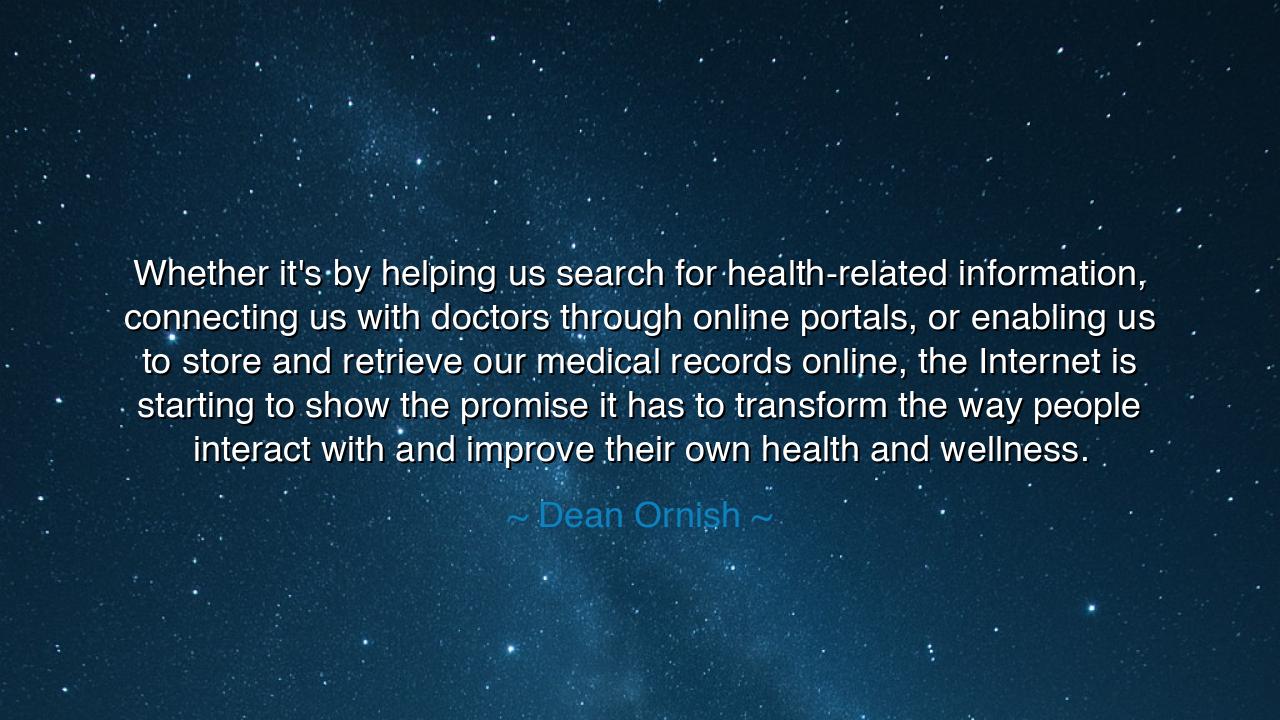
Whether it's by helping us search for health-related information
Whether it's by helping us search for health-related information, connecting us with doctors through online portals, or enabling us to store and retrieve our medical records online, the Internet is starting to show the promise it has to transform the way people interact with and improve their own health and wellness.






The words of Dean Ornish—“Whether it's by helping us search for health-related information, connecting us with doctors through online portals, or enabling us to store and retrieve our medical records online, the Internet is starting to show the promise it has to transform the way people interact with and improve their own health and wellness.”—speak of a great turning point in human history. For in them we hear not only the marvel of technology, but the ancient yearning of humankind to master illness, to extend life, and to draw wisdom from every tool at its disposal. The Internet, once a network for knowledge and commerce, now rises as a healer’s assistant, a bridge between patient and physician, a storehouse of remedies and records.
From the earliest times, people have sought ways to preserve and share the knowledge of health and wellness. The ancients carved remedies into clay tablets, copied herbal cures into manuscripts, and passed healing lore by word of mouth across generations. Each advance in communication—papyrus, parchment, printing press—became a vessel for medicine as much as for philosophy or poetry. Now, Ornish reminds us, the digital web has become the newest vessel, carrying with it the potential to democratize knowledge once locked away in ivory towers and hospital archives.
Consider the story of Florence Nightingale, who in the 19th century transformed not only nursing but also the way information was used in medicine. By collecting and organizing statistics on sanitation and patient outcomes, she used data to save countless lives during the Crimean War. What she did with pencil, paper, and meticulous charts, we can now do on a global scale with the Internet: gathering, sharing, and applying knowledge instantly to prevent suffering and death. Ornish’s vision is the continuation of Nightingale’s legacy—information wielded as a weapon against disease.
The meaning of this quote is also deeply democratic. In the past, only the wealthy or well-connected had easy access to doctors or medical libraries. The poor were left with superstition, guesswork, and suffering. But with the Internet, a villager in a remote corner of the world can now consult health-related information, can connect with a physician across oceans, can keep records once lost in paper shuffles. This is the leveling of the field of medicine, the breaking down of barriers that kept healing in the hands of a privileged few.
Yet Ornish’s words carry both promise and warning. For though the Internet can illuminate, it can also mislead. Not every voice online is wise, and not every cure is true. Just as in ancient times false healers sold potions and charms, so too do modern charlatans peddle misinformation in digital form. The challenge, then, is to cultivate discernment: to seek truth among the noise, to listen to trusted guides, to use the tool with wisdom rather than haste.
The lesson for us is clear: embrace the transformative power of technology, but do so with vigilance. Use the Internet to learn, but temper curiosity with critical thought. Let it connect you with doctors, but honor their expertise. Let it store your records, but safeguard your privacy. Above all, let it inspire you to take active part in your own health, for never before have ordinary people had such power to shape their wellness through access to knowledge and connection.
Practical action lies open: seek reliable sources of medical information, share knowledge with those who lack it, and encourage the building of systems that connect patients to caregivers more effectively. Use online tools to track your health not as a replacement for wisdom, but as a companion to it. Teach children to respect the power of knowledge and to question false claims. In this way, we transform the Internet from a distraction into an instrument of healing, a digital temple where wisdom and compassion converge.
So let Dean Ornish’s words be carried forward as a prophecy fulfilled: that the tools of the modern age, if used with wisdom, can heal as powerfully as herbs and prayers once did. The Internet is not the healer, but the bridge; not the cure, but the path to it. Let us walk that path with reverence, discernment, and courage, so that generations to come may inherit a world where knowledge flows freely, where health is shared, and where wellness is no longer a privilege, but a birthright.






AAdministratorAdministrator
Welcome, honored guests. Please leave a comment, we will respond soon